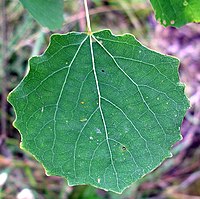
Photo from wikipedia
Fast-growing poplar has become an extensively planted fast-growing forest tree species because of its short plantation rotation, lightweight character, and strong adaptability. However, fast-growing poplar usually exhibits some disadvantageous properties,… Click to show full abstract
Fast-growing poplar has become an extensively planted fast-growing forest tree species because of its short plantation rotation, lightweight character, and strong adaptability. However, fast-growing poplar usually exhibits some disadvantageous properties, such as inferior mechanical properties, high hygroscopicity, and poor dimensional stability, which limits its applications to a great extent. Herein, a simple method for improving the water resistance and mechanical properties of fast-growing poplar wood using the biobased monomer isobornyl methacrylate (IBOMA) was investigated. Wood/PIBOMA composites were prepared by impregnating the wood matrix with IBOMA ethanol solution, and then the IBOMA in the wood matrix was heated to initiate in situ polymerization. Field emission scanning electron microscopy (FE-SEM) and X-ray diffraction (XRD) were used to investigate the properties of fast-growing wood/PIBOMA composites. The results showed that the IBOMA successfully penetrated the wood structure and polymerized in the cell walls and cell lumens. Thereby, the water resistance and mechanical properties of the fast-growing poplar were effectively improved. In addition, the water uptake of the wood decreased from 168.3% to 35.8% after impregnation with the 90% IBOMA solution. The modulus of rupture (MOR), modulus of elasticity (MOE), and compression strength (CS) of the 90% wood/PIBOMA composites were increased by 82.7, 28.6, and 2.3%, respectively.
Journal Title: Bioresources
Year Published: 2020
Link to full text (if available)
Share on Social Media: Sign Up to like & get
recommendations!